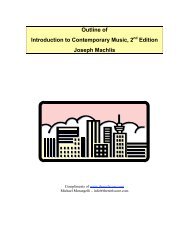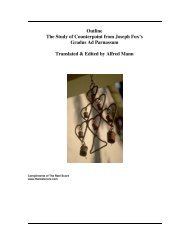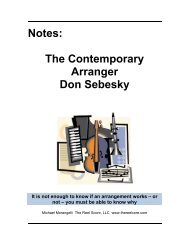An Outline of The History of Western Music Grout ... - The Reel Score
An Outline of The History of Western Music Grout ... - The Reel Score
An Outline of The History of Western Music Grout ... - The Reel Score
Create successful ePaper yourself
Turn your PDF publications into a flip-book with our unique Google optimized e-Paper software.
2: the Bourbon family failed to gain support <strong>of</strong> the growing and powerful middle<br />
class and in 1830, Louis-Philippe <strong>of</strong> the Orléans line on the throne as a<br />
constitutional monarch in the bloodless "July Revolution"<br />
b) the government continued to subsidize opera and concerts with the opera theater<br />
leased to a businessman Louis Véron who found wealthy sponsors - anyone<br />
could purchase tickets but the boxes rented at high prices<br />
2. But with the change in political control and the comparative decline in royal<br />
patronage change came to the French opera<br />
3. New forms<br />
a) Gasparo Spontini (1774-1851) united the heroic character typical <strong>of</strong> the late Gluck<br />
operas with the dramatic tension <strong>of</strong> the then popular rescue plot - resulted in a<br />
new type <strong>of</strong> serious opera clothing the whole in a grand display <strong>of</strong> solo, choral,<br />
and orchestral magnificence<br />
b) Grand Opera<br />
1: with the continued decline <strong>of</strong> royal patronage, this was designed to appeal to<br />
the relatively uncultured audiences who thronged the opera theaters looking for<br />
excitement and entertainment<br />
2: leaders <strong>of</strong> this school were the librettist Eugène Scribe (1791-1861), the<br />
composer Giacomo Meyerbeer (1791-1864), and the director <strong>of</strong> the Paris Opera<br />
<strong>The</strong>ater Vèron<br />
3: the French ideal <strong>of</strong> grand opera stayed alive to some extent throughout the 19th<br />
century, influencing the work <strong>of</strong> Verdi and Wagner<br />
4: it also still survives in 20th century works such as Darius Milhaud's Christophe<br />
Colomb, Samuel Barber's <strong>An</strong>tony & Cleopatra, and John Corigliano's <strong>The</strong><br />
Ghosts <strong>of</strong> Versailles<br />
5: Composers around 1830 most productive in the Grand Opera genre<br />
i- Francois Auber (1782-1871)<br />
ii- Gioachino Rossini (1792-1868)<br />
iii- Jacques Fromental Halévy (1799-1862)<br />
c) Opéra Comique<br />
1: pursued its course in France side by side with Grand Opera<br />
i- used a spoken dialogue instead <strong>of</strong> the recitative <strong>of</strong> Grand opera<br />
ii- less pretentious than Grand Opera, requiring fewer singers and players and<br />
was written in a simpler musical idiom<br />
iii- the plots - as a rule - presented straightforward comedy (comic type) or<br />
semi-serious drama (romantic type) instead <strong>of</strong> the historical pageantry <strong>of</strong><br />
Grand Opera<br />
2: Composers <strong>of</strong> Opéra Comique<br />
i- Francois Adrien Boieldieu (1775-1834)<br />
ii- Ferdinand Hérold (1791-1833)<br />
iii- Daniel Francois Esprit Auber (1782-1871)<br />
d) Opéra bouffe<br />
1: another new genre - not to be confused with the 18th century Italian opera buffa<br />
- emphasised the smart, witty, and satirical elements <strong>of</strong> comic opera





